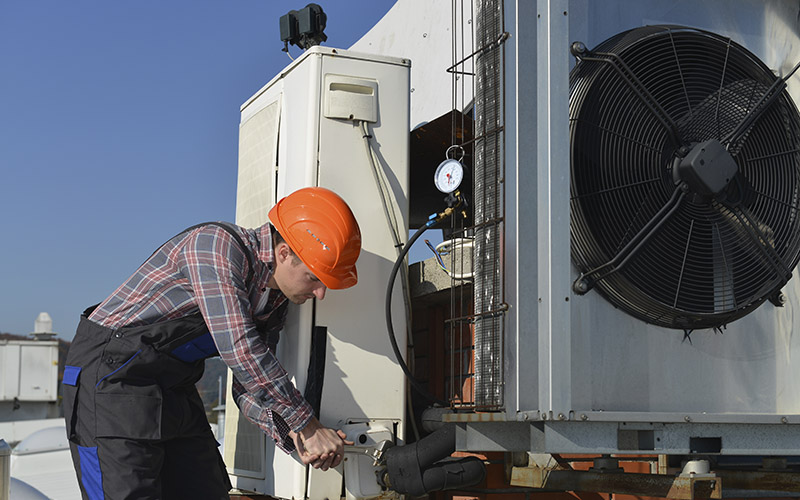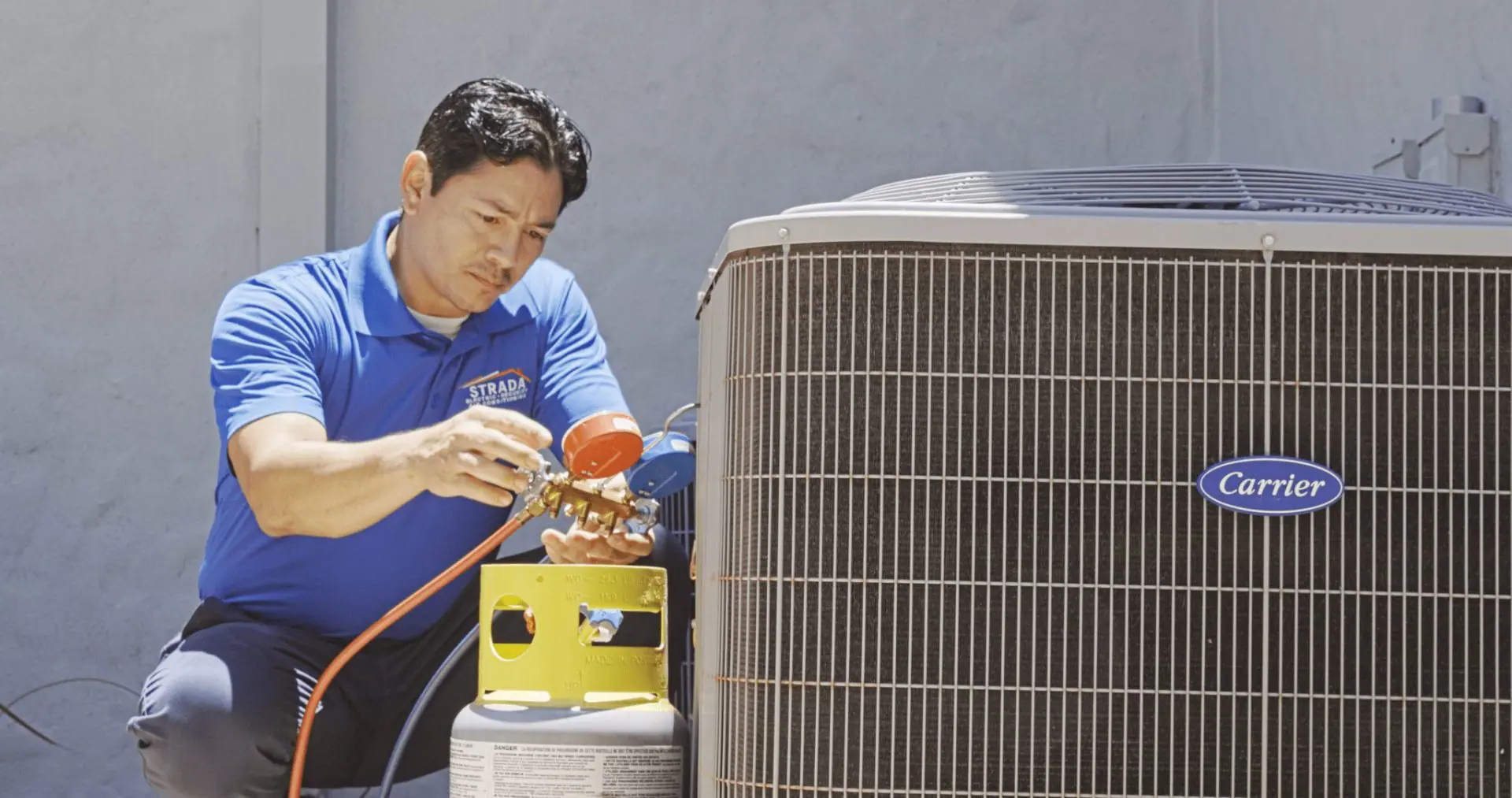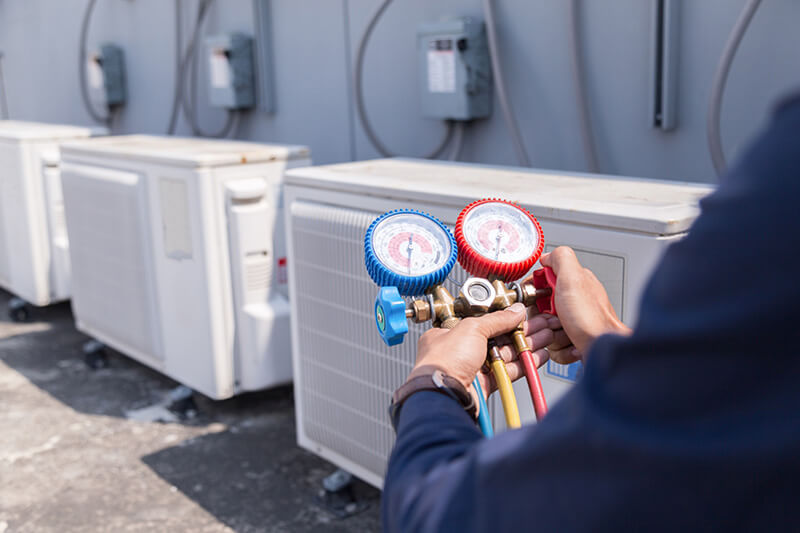Tips for Prolonging HVAC Lifespan Through Consistent heat pump service
Tips for Prolonging HVAC Lifespan Through Consistent heat pump service
Blog Article
Exactly How a Warm Pump and Heater Job With Each Other to Maximize Your Home's Heating Effectiveness
Understanding just how a heatpump and furnace interact is vital for homeowners looking for effective heating options. Each system has its strengths, giving a well balanced approach to home convenience. The heatpump masters moderate temperature levels, while the heating system delivers fast warmth throughout extreme cold. This harmony not just decreases power expenses however also improves the lifespan of both home appliances. What factors affect this collaboration, and just how can property owners maximize their benefits?
Recognizing Heat Pumps: Just How They Work
Although many individuals may be not familiar with their internal functions, warm pumps play a vital role in contemporary heating unit. These tools run by moving heat from one place to one more, making use of the principles of thermodynamics. In colder months, a warm pump essences warm from the outdoors air, ground, or water, and transfers it inside to warm the living area. Alternatively, throughout warmer months, it can turn around the process, serving as an air conditioning unit by getting rid of warmth from inside to the outside.Heat pumps contain an evaporator, growth, compressor, and condenser shutoff. The cooling agent within the system soaks up heat as it vaporizes at reduced temperatures and stress. The compressor after that increases the stress and temperature level of the refrigerant, enabling it to release warm as it condenses. This reliable process can significantly lower energy intake contrasted to typical home heating methods, making heatpump a lasting option for environment control in homes.
The Function of Heaters in Home Home Heating
Furnaces play a vital duty in home heating by providing a dependable source of warmth during the cooler months. They operate by generating warm via burning or electric resistance, distributing it throughout the home using air ducts or radiant systems. The efficiency of a heater is often gauged by its Yearly Fuel Utilization Performance (AFUE) score, which indicates just how successfully the unit transforms fuel into heat.Furnaces can make use of different power sources, consisting of all-natural gas, oil, electrical energy, or propane, permitting property owners to choose the most suitable choice for their needs. Unlike heat pumps, which may have a hard time in extreme cold, furnaces keep constant performance, ensuring that interior temperatures continue to be comfortable no matter outside problems. Additionally, modern-day heaters typically come equipped with innovative modern technology, such as wise thermostats and variable-speed blowers, enhancing their effectiveness and responsiveness. This versatility makes heating systems an important part in all-encompassing home heating techniques.

Benefits of Using Both Equipments With Each Other
Integrating the staminas of both furnaces and warmth pumps can cause a much more efficient and reliable home heating service. Utilizing both systems permits house owners to capitalize on the warmth pump's power efficiency throughout milder temperature levels while relying on the heater for even more extreme cold problems. This double approach can substantially lower energy costs, as heatpump take in much less electrical power than traditional home heating methods when temperature levels are moderate.Additionally, making use of both systems together can enhance convenience levels in the home. Warm pumps can offer regular, also heating, while heaters can rapidly elevate ambient temperatures when required. The combination of both systems can expand the lifespan of devices by lowering wear and tear on each unit, as they share the work. Inevitably, property owners can appreciate a balanced, economical home heating solution that changes flawlessly to differing weather, making certain a warm and welcoming home throughout the cold weather.
Exactly How Warm Pumps and Furnaces Enhance Each Various Other
When homeowners integrate heatpump and heating systems, they develop a corresponding home heating system that optimizes performance and comfort. Warm pumps run by transferring warm from the outside air or ground, making them very effective in modest climates. They excel throughout milder temperature levels, supplying cost-efficient heating. On the other hand, furnaces generate heat through combustion or electrical resistance, delivering solid, prompt heat throughout severe cold conditions.The combination of these 2 systems permits dynamic changes based on temperature level variations. Throughout warmer months or milder wintertime days, the warm pump can take the lead, saving energy and lowering prices. As temperatures drop, the heater can flawlessly involve, making sure consistent heat throughout the home. This harmony not only maximizes power use yet likewise enhances the life-span of both systems, as each system operates within its excellent efficiency range. With each other, they produce a balanced atmosphere that adapts to varying climate needs.
Optimizing Effectiveness: Tips for Homeowners
House owners can enhance their home heating effectiveness through a number of sensible methods. Establishing a normal maintenance schedule, incorporating smart thermostat modern technology, and executing reliable insulation and sealing remedies are essential actions. These procedures not only enhance convenience however also minimize power costs.
Routine Upkeep Schedule
To ensure optimal heating effectiveness, developing a regular upkeep timetable is necessary for any home. House owners need to prioritize regular evaluations of both heatpump and furnaces to establish peak efficiency. This consists of changing air filters every one to 3 months, as clogged up filters can significantly minimize performance. In addition, scheduling professional maintenance at the very least as soon as a year permits specialists to determine and resolve potential issues before they intensify. House owners need to additionally cleanse the heatpump's outside system to stop debris accumulation that can impede air flow. By sticking to a regular maintenance routine, home owners not just enhance their heating systems' efficiency however likewise extend their lifespan, resulting in higher comfort and lowered power expenses throughout the chillier months.
Smart Thermostat Combination
Integrating a smart thermostat right into a home furnace can substantially improve energy performance, particularly as it enables specific control over temperature settings. These gadgets can learn the homeowner's timetable and preferences, automatically readjusting the temperature to maximize comfort while minimizing power use. They can decrease heating throughout times when the home is vacant, lowering unnecessary intake. Numerous smart thermostats likewise provide real-time power usage information, enabling home owners to make educated choices regarding their home heating routines. Furthermore, remote accessibility through smart device apps allows users to change setups from anywhere, guaranteeing the home is cozy upon return. Overall, wise thermostat assimilation not only enhances convenience but significantly adds to power financial savings and efficiency.
Insulation and Sealing Solutions
Smart thermostats play a critical duty in energy efficiency, yet their effectiveness can be considerably improved by appropriate insulation and sealing remedies. Home owners ought to focus on insulating floorings, attic rooms, and walls to lessen warm loss. High-grade insulation products, such as spray foam or fiberglass, can considerably enhance thermal resistance. In addition, securing spaces around air ducts, windows, and doors avoids chilly air seepage and heat escape. Weatherstripping and caulking work techniques for resolving these leakages - furnace replacement. Normal examinations for air leakages, in addition to making use of blower door examinations, can aid determine trouble areas. By buying insulation and securing, home owners can enhance the efficiency of their furnace, eventually bring about reduced energy usage and lower utility expenses
Usual Misconceptions Concerning Warm Pumps and Furnaces
What false impressions surround heatpump and furnaces? Several people incorrectly think that heatpump are inadequate in chillier environments. In truth, modern heatpump are developed to run efficiently also in reduced temperatures, giving trustworthy heating throughout winter months. An additional usual misconception is that heating systems are constantly extra efficient than heat pumps. Nonetheless, this depends upon the specific energy resources and efficiency ratings of the systems in question. Some might also believe that utilizing both systems at the same time is unnecessary, but in fact, this combination can optimize heating efficiency, particularly throughout severe weather condition conditions. Furthermore, people commonly assume that heatpump need continuous maintenance, when truthfully, they have comparable upkeep needs to traditional furnace. By disproving these myths, home owners can make more educated decisions regarding their heating choices, ultimately causing boosted comfort and energy effectiveness in their homes.
Maintenance Factors To Consider for Combined Equipments

Often Asked Questions
Can Warmth Pumps Work Efficiently in Exceptionally Cold Climates?
Heatpump can battle in extremely cool environments as a result of decreased efficiency and warmth extraction limitations. Nevertheless, developments in modern technology have actually resulted in designs designed for much better efficiency in such conditions, boosting their feasibility in extreme atmospheres.
Exactly How Lengthy Do Heat Pumps and Furnaces Typically Last?
Heatpump commonly last 15 to twenty years, while furnaces have a life expectancy of 15 to three decades. Regular maintenance can expand their longevity, making sure efficient operation and minimizing the need for early replacements.

What Is the Typical Cost of Putting Up Both Systems?
The ordinary cost of mounting both a warmth pump and a furnace generally ranges between $5,000 to $10,000 - ductless mini splits. Elements affecting this cost include system size, installation complexity, and regional labor rates
Are There Tax Obligation Incentives for Making Use Of Energy-Efficient Heating Equipments?
Numerous property owners ask about tax motivations for energy-efficient heating unit. Various government and state programs usually offer refunds or credit ratings, motivating the adoption of lasting technologies to minimize energy usage and promote environmental obligation.
Exactly how Do I Select the Right Size Warmth Pump and Heating System?
Selecting the appropriate dimension heatpump and heating system includes calculating the home's square video footage, thinking about insulation high quality, and assessing local climate. Consulting a specialist can ensure ideal system performance and energy efficiency based on details needs. ductless mini splits. Comprehending exactly how a warmth pump and furnace work with each other is necessary for house owners looking for efficient heating options. check this site out In colder months, a heat pump essences warm from the outside air, ground, or water, and transfers it inside to warm up the living space. When home owners integrate heat pumps and furnaces, they produce a corresponding home heating system that maximizes effectiveness and convenience. Warmth pumps run by transferring warm from the outdoors air or ground, making them very efficient in moderate climates. Warmth pumps can have a hard time in incredibly cold climates due to decreased performance and heat removal constraints
Report this page